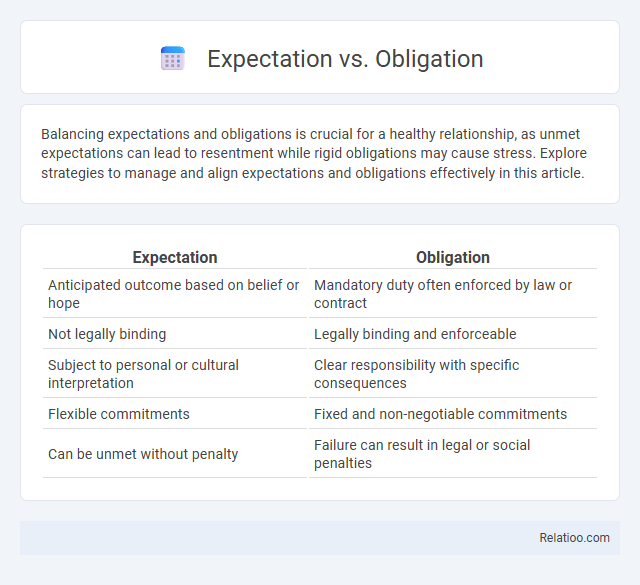Balancing expectations and obligations is crucial for a healthy relationship, as unmet expectations can lead to resentment while rigid obligations may cause stress. Explore strategies to manage and align expectations and obligations effectively in this article.
Table of Comparison
| Expectation | Obligation |
|---|---|
| Anticipated outcome based on belief or hope | Mandatory duty often enforced by law or contract |
| Not legally binding | Legally binding and enforceable |
| Subject to personal or cultural interpretation | Clear responsibility with specific consequences |
| Flexible commitments | Fixed and non-negotiable commitments |
| Can be unmet without penalty | Failure can result in legal or social penalties |
Defining Expectation and Obligation
Expectation refers to a belief or anticipation that a certain outcome or behavior will occur based on prior knowledge, social norms, or personal goals. Obligation denotes a moral or legal duty that requires an individual to perform specific actions or adhere to particular standards, often backed by rules or ethical principles. Both concepts differ in that expectation relies on assumptions about what should happen, while obligation mandates what must be done.
Origins of Expectations in Society
Origins of expectations in society stem from cultural norms, social roles, and collective values that shape individual behavior and interactions. Expectations arise as unwritten rules that guide conduct, rooted in historical traditions and reinforced through socialization processes such as family upbringing, education, and community engagement. These societal expectations often lead to obligations, while incompatibility occurs when personal values or circumstances conflict with established norms.
The Nature of Obligations
Obligations represent binding duties or commitments that require specific actions or behaviors, distinguishing them from mere expectations, which are anticipations without enforceability. Incompatibility arises when fulfilling one obligation prevents the fulfillment of another, creating a conflict that demands resolution. Your understanding of the nature of obligations is essential to navigate responsibilities effectively and manage conflicts between competing duties.
Psychological Impact of Expectations
Expectations often create internal pressure that influences your emotional well-being and can lead to stress or disappointment when unmet. Obligations, typically external demands, may conflict with personal goals, intensifying feelings of resentment or burnout. Incompatibility between expectations and obligations disrupts psychological balance, causing cognitive dissonance and heightened anxiety levels.
Social Pressure and Obligatory Actions
Social pressure often creates a blurred line between expectation and obligation, compelling Your actions to align with unwritten societal rules. Obligatory actions arise when external demands transform personal choices into perceived duties, intensifying stress and reducing autonomy. The incompatibility between genuine desires and imposed obligations leads to internal conflict and social dissatisfaction.
Expectations in Personal Relationships
Expectations in personal relationships refer to the anticipations or beliefs individuals hold about their partner's behavior, roles, and emotional support, which shape interaction quality and relationship satisfaction. They often influence communication patterns and conflict resolution, serving as a blueprint for mutual understanding and trust. Unrealistic or unmet expectations can lead to disappointment, stress, and relationship strain, highlighting the need for clear dialogue and adaptability.
Obligations in Professional Settings
Obligations in professional settings often require strict adherence to ethical standards, company policies, and legal regulations to ensure accountability and maintain trust. Your compliance with these obligations fosters a reliable work environment and helps prevent conflicts that arise from unmet expectations or incompatible roles. Balancing obligations alongside expectations clarifies responsibilities and promotes effective collaboration within the workplace.
Navigating Conflicts Between Expectation and Obligation
Navigating conflicts between expectation and obligation requires clear prioritization of responsibilities while managing personal or external anticipations. Your ability to set boundaries and communicate effectively can reduce misunderstandings, ensuring obligations are fulfilled without compromising important expectations. Balancing these elements involves recognizing incompatible demands and strategically negotiating which commitments align best with your values and goals.
Strategies for Managing Expectations and Obligations
Effective strategies for managing expectations and obligations include clear communication, setting realistic goals, and prioritizing tasks based on urgency and importance. Establishing boundaries helps prevent role incompatibility and reduces stress by ensuring that obligations do not conflict with personal or professional values. Utilizing time management tools and regularly reviewing commitments can further align expectations with actual capabilities, fostering accountability and productivity.
Balancing Personal Desires and Societal Duties
Balancing personal desires and societal duties involves navigating expectations, obligations, and incompatibilities to maintain harmony between individual goals and community standards. Expectations represent the anticipated behaviors or achievements based on social norms, while obligations are the duties imposed by laws, ethics, or roles that individuals must fulfill. Incompatibility arises when personal desires conflict with societal demands, requiring conscious compromises to uphold social cohesion without sacrificing core personal values.

Infographic: Expectation vs Obligation
 relatioo.com
relatioo.com